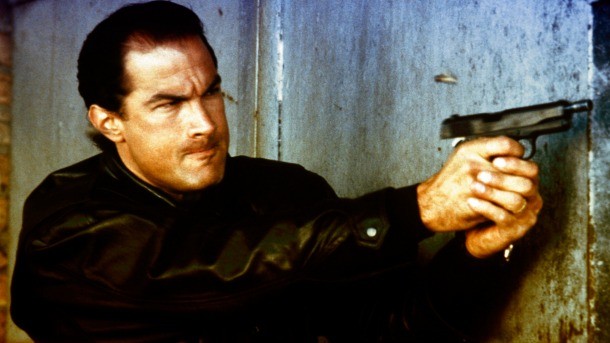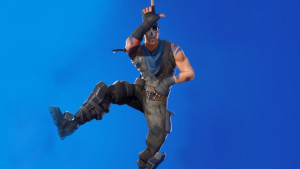Please support Game Informer. Print magazine subscriptions are less than $2 per issue
How Mortal Kombat Changed The Industry And Helped Create E3

Today, NetherRealm announced Mortal Kombat X, the latest in the long-running franchise. But the franchise’s influence on the fighting genre pales in comparison to how the controversy surrounding Mortal Kombat reshaped the game industry.

Blame It On Seagal and Van Damme?
According to Steve Kent’s The Ultimate History of Video Games, the Mortal Kombat loved by gamers and hated by authority figures of the early ‘90s almost never came to be. Originally, creators Ed Boon and John Tobias wanted to create a Street Fighter II-inspired game and have it attached to the likenesses of a ‘90s martial-arts action hero like Steven Seagal or Jean Claude Van Damme. However, both stars had already inked deals with other game companies, so Boon and Tobias went back to the drawing board, creating the Mortal Kombat universe we know today. It’s highly likely that a licensed game starring Van Damme or Seagal would have avoided the ultraviolence (and controversy) that Mortal Kombat courted.

Tipping Point In the Console Wars
While the series started as an arcade sensation, Mortal Kombat actually played a big role in the battle between the Sega Genesis and Nintendo’s SNES. Although the SNES was the more technically advanced system, the Genesis had experienced major success in the U.S. based on the popularity of Sonic the Hedgehog, its strong third-party publisher support, and its more aggressive marketing strategies (see: “Genesis Does What Nintendon’t").
Consumers were excited by the prospect of the ultra-popular arcade game coming to home consoles, but Nintendo balked at the excessive violence and innuendo. Former Nintendo of America head Howard Lincoln told Kent, “We had game standards that we were enforcing all along. We made a list of things you can and can’t do: 'No excessive blood and violence.' 'No sex.' Applying those standards to Mortal Kombat, we told Acclaim that they would have to tone down their version of Mortal Kombat, which, I believe, was going to come out in September of ‘93.”
Sega, on the other hand, allowed Acclaim to make Mortal Kombat the way it wanted – it was dubbed “Arcade Edition” in ads (see below) and had all the violent content of the original. Of course, gamers quickly sussed out that the SNES version was tame, and as a result, the Genesis version far outsold the Nintendo iteration. It was one of the factors that Sega of America head Tom Kalinske credited with helping Sega reach a 55-percent market share in America, the first time the company had pulled ahead of Nintendo.

Shady Politics?
Mortal Kombat, alongside Sega’s interactive full-motion video game Night Trap, would end up taking the video game industry all the way to Capitol Hill – though not in the way the growing industry probably hoped.
A growing concern about video game violence was starting to percolate, and in the fall of 1993, Senator Joseph Leiberman (who would later run for vice president with John Kerry) and Senator Herb Kohl called Senate in Washington to weigh the issue. The highly violent and highly popular Mortal Kombat and Sega (which had allowed the uncensored version on the Genesis) were largely the whipping boys for the assembled politicians and expert witnesses. Nintendo, which did have a more family-friendly software portfolio and had required Acclaim to censor MK on SNES, came off as the “good guy” and was even praised by Lieberman as being “a damn sight better than the competition.”
However, strong suggestions that Nintendo played a role in encouraging this government intervention as a way of publicly shaming its chief competition have always existed. In The Ultimate History of Video Games, Tom Zito, founder of Digital Pictures (which had developed Night Trap for Sega) is quoted as saying, “I think all that stuff that happened with the Senate was really orchestrated by Nintendo.”
When I recently interviewed Blake J. Harris, the author of the recently released book Console Wars: Sega, Nintendo, and the Battle That Defined a Generation, about the rumblings that Nintendo played a hand in the Senate hearings, he responded, “I had mentioned earlier that Nintendo had purchased the Seattle Mariners. That was about a year and a half before the hearings. The person who was at the forefront of that [deal] was a senator from Seattle named Slade Gorton. He was a close personal friend of Senator Lieberman, who was also at the forefront of the violence hearings. I don’t know if there’s a connection with that relationship and the fact that the hearings were called or whether that’s a matter of coincidence, but the hearings themselves are pretty interesting.”
This seems to be backed up by a quote from Lieberman, who said, “I had not heard about [Nintendo’s] Howard Lincoln before we planned the whole thing. In fact, to be very honest about it, once the hearings were announced, I saw Slade Gorton on the floor of the Senate one day and he said, ‘I just got a call from the folks at Nintendo, which is real important in Seattle...There’s a guy named Howard Lincoln who you’ve called to testify, do you mind speaking to him or having your staff speak to him?”
We do know that – whether Nintendo had helped orchestrate the hearings or not – the company did sense that it was an opportunity to burn Sega. Sega’s Tom Kalinske had actually written a letter to Nintendo asking that the companies cooperate together to help the industry as a whole. The letter was reportedly returned to him in shreds.
Throughout the hearings, Sega, Acclaim, and Mortal Kombat were brought up again and again as evidence that the game industry was a menace to America’s children. Recalling the first time an aide had shown him Mortal Kombat, Lieberman said, “I was startled. It was very violent, and as you know, rewarded violence. And at the end, if you really did well, you’d get to decide whether to decapitate...how to kill the other guy, how to pull his head off. There was all sorts of blood flying around.”

The Lasting Influence
Make no mistake: without a hugely popular, extremely violent game like Mortal Kombat to spur on controversy, it’s highly unlikely that the 1993 U.S. Senate hearings on video games would have occurred. And, while the hearings were a stressful time for the industry (especially Sega and Acclaim), they had many lasting effects – many of them which ended up benefiting video games in the long term.
The most important was the formation of the Independent Digital Software Association. After being called on the carpet by the Senate, the game industry knew it needed a stronger industry body to help protect its interests and lobby in Washington. The organization changed its name to the Entertainment Software Association in 2003, and still fills the same important role today. In fact, when the Supreme Court decided the Brown vs. EMA case regarding whether games were protected by the First Amendment, the ESA was the organization that paid for the industry’s legal representation.
Even as it resisted the government’s efforts at censorship in 1993, the game industry recognized that it needed to do some self-regulation in order to avoid the government stepping in and doing it for them. The IDSA, after some debate, ended up creating a new system of ratings, and a ratings board (the Entertainment Software Ratings Board or ESRB) to assign ratings. Though Sega wanted the industry to adopt the ratings it had already been using on Genesis games, the ESRB eventually came up with the Everyone, Teen, Mature, etc. ratings designations we still use today.
The formation of the IDGA also resulted in the creation of E3, the game industry’s biggest event of the year. Previously, most game companies showed off their wares and made big announcements at the Consumer Electronics Show in Las Vegas. However, the growing industry was unsatisfied with its second-banana status and the refusal of CES’s organizers to give it a more private, industry-only area. So, in 1995, the first E3 was put on in Los Angeles and included most of the industry’s large players, including Sega and Nintendo.
As you can see, Mortal Kombat casts a long shadow, not just in the fighting game genre, where it maintained its dominance for over 20 years, but in the industry as a whole. The world of video games would be much different without Mortal Kombat, and much poorer for it.
Acknowledgements: I relied heavily on my friend Steven L. Kent’s excellent The Ultimate History of Video Games for this piece. It remains the most comprehensive text on the history of games. Also thanks to Blake J. Harris and his great new book Console Wars: Sega, Nintendo, and the Battle That Defined A Generation.










